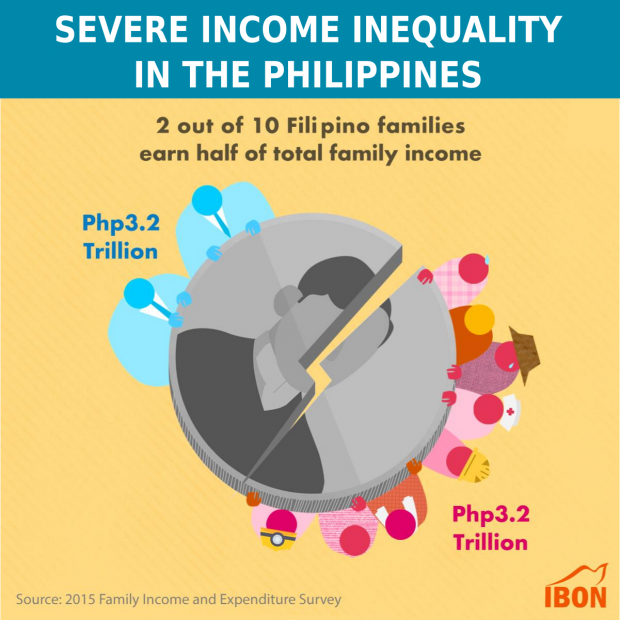The inflation spike marks the start of increases driven by the Tax Reform for Acceleration and Inclusion (TRAIN) in the prices of basic goods and services for the next three years, research group IBON said.
Further inflationary surges are likely to happen in 2019 and 2020 when the next two rounds of additional taxes on oil products take effect.
The Duterte administration’s banner TRAIN is among the biggest factors driving the inflation rate to its highest in over six years, said the group.
IBON noted that the headline inflation rate of 4.5 percent year-on-year in April is the highest since late 2011, bringing the year-to-date average inflation rate to 4.1 percent.
This already breaches government’s inflation target for 2018.
As it is, food, vegetable and fuel prices are already higher from a year ago, IBON observed.
The price of regular milled rice has increased from Php35 to Php40 per kilo, of galunggong from P140 to Php160, of pork liempo from Php225 to Php240, sitao from Php60 to Php100 per bundle, and red onions from Php50 to Php80.
Just since January, the price in Metro Manila of diesel has gone up by over Php7 per liter to Php44.35 and of gasoline by some Php6.80 to Php55.37.
LPG is also already much more expensive at some Php650-750 for an 11-kg cylinder.
“The higher prices of basic commodities hit the country’s poorest 17.2 million families who do not get any personal income tax (PIT) benefits the worst. This burden belies the Department of Finance’s (DOF) fake news claim that ’99 percent of taxpayers’ will benefit from TRAIN,” IBON executive director Sonny Africa said.
Africa also said that government economic managers are being dishonest and insensitive when they downplay the impact on prices by saying that the inflation spike is only temporary.
“The price increases from TRAIN are very permanent and even if inflation rates moderate this does not mean that prices will be lower,” Africa said.
“It is grossly deceitful for economic managers to give the impression or claim otherwise. Prices will continue to rise for the poor from TRAIN’s new and higher taxes unless the government says that the inflation rate will turn negative, which is unlikely,” he added.
According to Africa, while there are many reasons for inflation the government only seeks to divert from its direct accountability for TRAIN-induced higher prices by exaggerating the effects of global oil price and the peso depreciation.
Dubai crude has been at US$62-66 per barrel and the peso at up to Php52.10 per US$1 since the start of the year.
However, even when the price of Dubai crude reached US$105 per barrel in 2013 inflation only averaged 2.6 percent.
Similarly, when the peso was at over Php54 per US$1 from late 2002 to mid-2004 inflation only averaged 2.5 percent , Africa explained.
Africa said that among all the major factors driving high prices, the government has the most control over the taxes it charges.
“If government wants to it can immediately lower inflation and prices for the people by suspending implementation and then repealing the grossly regressive TRAIN law,” he said.
Revenues can and should instead be raised with progressive tax reforms that increase the burden on the country’s super-rich and that relieve the poor majority while their incomes are still so low, Africa concluded.# (IBON.org)

